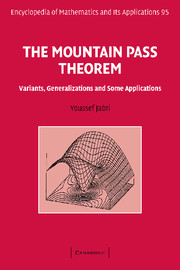Book contents
- Frontmatter
- Contents
- Introduction
- 1 Retrospective
- I First Steps Toward the Mountains
- 2 Palais-Smale Condition: Definitions and Examples
- 3 Obtaining “Almost Critical Points” – Variational Principle
- 4 Obtaining “Almost Critical Points” – The Deformation Lemma
- II Reaching the Mountain Pass Through Easy Climbs
- III A Deeper Insight in Mountains Topology
- IV The Landscape Becoming Less Smooth
- V Speculating about the Mountain Pass Geometry
- VI Technical Climbs
- A Background Material
- Bibliography
- Index
2 - Palais-Smale Condition: Definitions and Examples
Published online by Cambridge University Press: 04 September 2009
- Frontmatter
- Contents
- Introduction
- 1 Retrospective
- I First Steps Toward the Mountains
- 2 Palais-Smale Condition: Definitions and Examples
- 3 Obtaining “Almost Critical Points” – Variational Principle
- 4 Obtaining “Almost Critical Points” – The Deformation Lemma
- II Reaching the Mountain Pass Through Easy Climbs
- III A Deeper Insight in Mountains Topology
- IV The Landscape Becoming Less Smooth
- V Speculating about the Mountain Pass Geometry
- VI Technical Climbs
- A Background Material
- Bibliography
- Index
Summary
(PS) is also crucial for the MPT. One can frequently, but not always, verify the condition (PS) for nonlinear partial differential equations.
E. Zeidler, Nonlinear functional analysis, III, Springer-Verlag, (p. 163)This chapter is a first attempt to introduce a compactness condition on functionals. It permits the extension of some interesting properties, proper to functionals, defined on finite dimensional spaces and infinite dimensional ones. It will play a central role in subsequent chapters. More elaborate aspects of this condition involving some material not yet presented are discussed in two later chapters
(Chapters 10 and 13).The Palais-Smale condition is a condition that appears in all the chapters, so it deserves this place at the beginning. The references [628, 683, 748, 882, 956] can be consulted for some material on the Palais-Smale condition.
A detailed chapter on the subject could seem rather technical to people new to critical point theory, so we decided to split it into three parts. This first one is very elementary, the second one (Chapter 10) assumes the reader has some background in the theory, while the third one (Chapter 13) is destined for more advanced readers.
Definitions
We begin by defining what is generally meant by the Palais-Smale condition.
- Type
- Chapter
- Information
- The Mountain Pass TheoremVariants, Generalizations and Some Applications, pp. 15 - 21Publisher: Cambridge University PressPrint publication year: 2003



